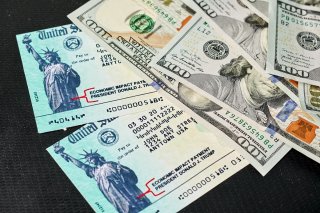Fact: Almost All Americans Think That Stimulus Checks Helped Their Financial Health
A survey, released by doxoINSIGHTS, found that ninety-five percent of Americans said the direct payments helped strengthen their finances during the last year, and sixty-three percent of poll respondents anticipate that their financial health will recover within a year.
Here's What You Need To Remember: The poll uncovered that the majority of stimulus check recipients put the money toward diminishing household bills. Among those who decided to pay off bills, seventy percent put the money toward utilities, forty-one percent allocated the money for mobile phones and thirty-nine percent put the additional relief toward cable and internet bills.
The majority of Americans said that the three rounds of stimulus payments from pandemic-related legislation have helped them boost their financial health over the past year, according to a new poll.
The survey, released by doxoINSIGHTS, found that ninety-five percent of Americans said the direct payments helped strengthen their finances during the last year, and sixty-three percent of poll respondents anticipate that their financial health will recover within a year.
More than ninety percent of participants said the stimulus payments helped them between “a little” and “a great deal.”
"While stimulus relief may have seemed short term, our surveys of household bill payers throughout the last year have indicated support from Americans, and a strong signal they used the money to improve their financial health," Jim Kreyenhagen, doxo’s Vice President of Marketing and Consumer Services, said. "We aim to make bill pay as transparent as possible for everyone. By offering breakdowns of how much Americans are paying on the whole as well as state-by-state for each of their household bills, and giving consumers access to a simpler, more accessible bill pay experience that eliminates hidden fees, we will continue to support people in developing or improving on their positive financial habits."
The poll also uncovered that the majority of stimulus check recipients put the money toward diminishing household bills. Among those who decided to pay off bills, seventy percent put the money toward utilities, forty-one percent allocated the money for mobile phones and thirty-nine percent put the additional relief toward cable and internet bills.
Another seventeen percent of respondents said that they used the money to pay down debt, while just ten percent of Americans decided to save the money.
Seventy percent of consumers also cut down at least one household bill due to the coronavirus pandemic’s financial impact, with nearly half of them deciding to slim down their cable and internet bill.
The federal government has passed three rounds of direct relief for qualifying Americans, including $1,200 direct payments in March 2020 through the Cares Act, $600 payments in December, and $1,400 payments in March under the new administration. Nearly eighty-seven percent of respondents in the doxoINSIGHTS poll received at least one stimulus payment.
Congressional Democrats have ramped up calls for recurring checks until the end of the pandemic, arguing that millions of Americans are not financially stable enough to pay basic bills and put food on the table.
Those calls have hit a brick wall on Capitol Hill, as not all Democrats support such a big-spending measure and as the White House hasn’t signaled its support for the push.
Rachel Bucchino is a reporter at the National Interest. Her work has appeared in The Washington Post, U.S. News & World Report, and The Hill.
Image: Reuters

